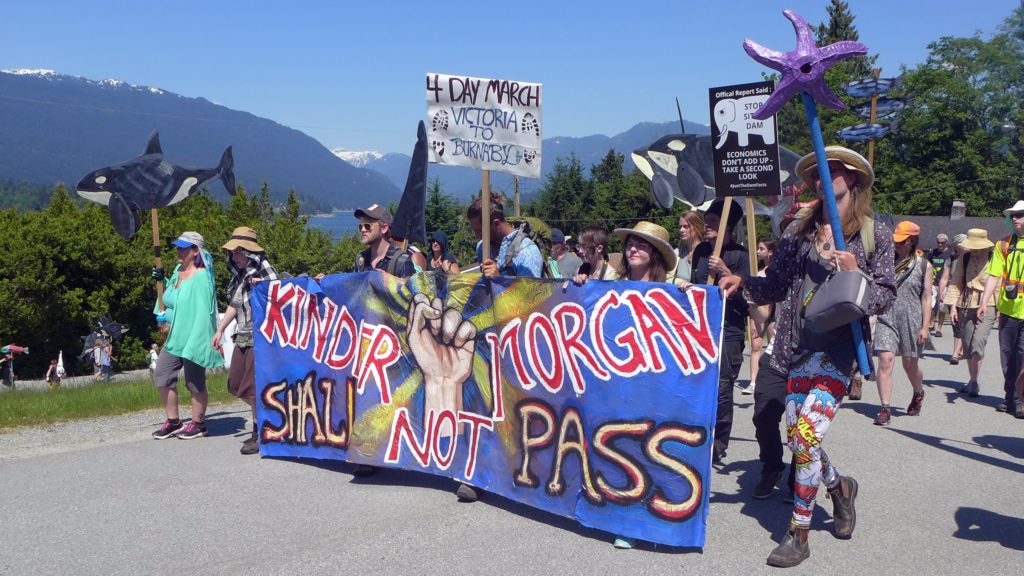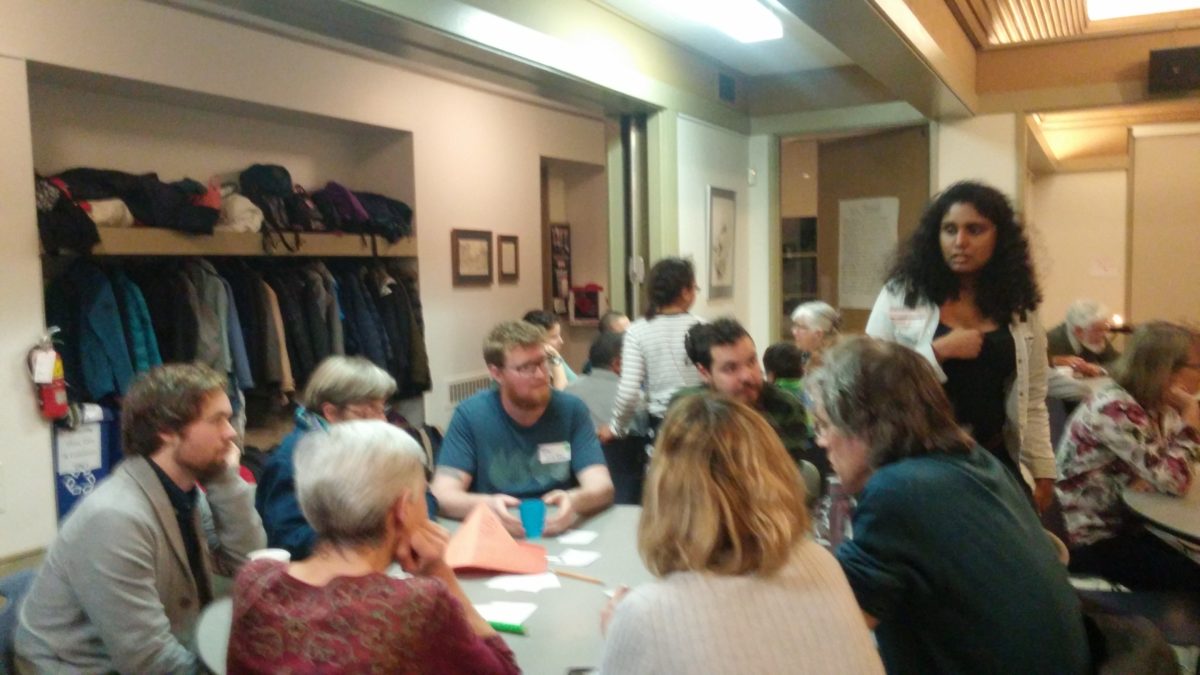E-newsletter from the Environment Team
Sign-up for E-news Updates from the Environment Team
usually sent out every 2-3 months.
[mailpoet_form id=”3″]
usually sent out every 2-3 months.
[mailpoet_form id=”3″]
Michael led a Sunday service in 2017 on “The Wicked Problem of: What’s for Dinner?”
Michael Bomford is a faculty member in the Sustainable Agriculture & Food Systems program at Kwantlen Polytechnic University. His work focuses on organic and sustainable agriculture systems suitable for adoption by small farms operating with limited resources.
from Kwantlen Polytechnical University website:
Dr. Michael Bomford
Faculty, Sustainable Agriculture & Food Systems
Mike has returned to BC from Kentucky, where he spent 10 years at Kentucky State University (KSU), leading research, extension, and teaching programs related to organic agriculture, with an emphasis on small farms. Before going to Kentucky, he completed a PhD at West Virginia University, conducting companion planting research on a newly-certified organic farm. He grew up the son of a District Agriculturalist among the expansive grain farms of BC’s Peace River region and earned degrees in plant science and agricultural pest management at UBC and SFU.
A passionate teacher, Mike helped launch a new Sustainable Agriculture degree program at the University of Kentucky in 2006; followed by a new Master of Science in Environmental Studies at KSU in 2010; and a new Bachelor of Agriculture, Food and Environment degree at KSU in 2012. In 2013 he was given his College’s Outstanding Teacher award and the USDA’s Honor Award for Excellence. He looks forward to applying this experience at KPU during the growth and development its new Sustainable Agriculture degree program.
Mike is very interested in the intersection between food and energy. He has explored energy consumption and greenhouse gas emissions associated with farming and food systems, and experimented with renewable energy production techniques for small farms.
Tamiko Suzuki is Outreach coordinator with the Environment Committee. She enjoys being part of a group of people with passion and energy to make a difference in the world. She found it was inspiring to see people setting up the Oak Street Farmers Market because they wanted local organic food while others organized or took part in marches because they supported causes such as fighting pipelines, mines, and climate change. With her connections to young activists (both my kids are activists) she hopes to be a bridge between young and old environmentalists and raise awareness of what the UCV is doing to a greater audience.
Outside of church, Tamiko works in Pathology at Children’s Hospital. She enjoys skiing, cycling, Zumba and International folk dance.
Building on the interest of the All Ages (Intergenerational) Activists Dinner held at the church in January, let’s share a bit of food and continue the discussion! This time we’ll meet outdoors at Trout Lake, sit on blankets, meet old and new friends, and talk about what direction we’d like these and future gatherings to take.
Rumour is that there may be some musical entertainment too!
Bring food to share (you can pick something up at the Trout Lake Farmers market!), your own plates and cutlery, and chairs if you are not comfortable sitting on the ground.
For more information or if you would like to help out, contact: Tamiko Suzuki
If the weather looks iffy, check this website on the morning of the event.

On July 8th, 2017, several members of the congregation attended Paddle for the Peace –Vancouver in Vanier Park, Kitsilano, to support the 12th Annual Paddle for the Peace celebration in the beautiful Peace River Valley, in northeastern British Columbia.
The Vanier Park event provided an opportunity for Metro Vancouver residents to show solidarity with Treaty 8 First Nations and farmers opposed to the Site C Dam — an $8 billion project that would flood an 80 kilometre stretch of the Peace River Valley.
For more info see:
Paddle for the Peace
Treaty 8 Tribal Association
Treaty 8 — Canadian Encyclopedia
Save the Peace River Valley: Stop Site C Dam.

Donate to our Green Fund to offset your trip’s carbon emissions. Calculate Co2 emissions

At least 22 Vancouver Unitarians participated in the Walk 4 the Salish Sea that began in Victoria on May 25 and ended at the Kinder Morgan terminal in Burnaby on May 28. One of us was present at virtually every stage of this march. It was an all-nations gathering against the Kinder Morgan pipeline expansion project and we were proud to be part of this public action.
This family event celebrates Burns Bog and global peatlands. Performers sing, drum, and dance as we walk through the Delta Nature Reserve. Recharge your spirits while surrounded by nature and good company. Join us in appreciating this natural green space in your community!
Burns Bog is the largest raised peat bog and the largest undeveloped urban land mass on the West Coast of the Americas.[1] Burns Bog was originally 10,000–12,000 acres (4,000–4,900 ha) before development. Currently, only 3,500 hectares (8,600 acres) remain of the bog.[2] It is the only estuarine raised peat bog formed in a marine west coast climate.
Burns Bog is habitat to more than 300 plant and animal species, and 175 bird species. Some of these animals are listed as endangered (i.e. red-listed) or vulnerable (i.e. blue-listed) under the BC Provincial Government Species at-risk designations. The bog is also a major migratory stopover for various bird species on the Pacific Flyway.[3]
After decades of work by the Corporation of Delta and the Provincial Government, in 2012 The Convention on Wetlands recognized the bog as a “Ramsar Wetland of International Importance”. (Wikipedia) As in, it’s a big deal.
A U.S. senator named Gaylord Nelson came up with the idea for a “national teach-in on the environment” after witnessing the ravages of the 1969 oil spill in Santa Barbara, Calif. Hoping to mobilize the politically active student community, he chose April 22nd (falling between Spring Break and final exams) as the official date. On that day in 1970, more than 20-million Americans took to the streets — as well as campuses, parks, and other public spaces — to demonstrate in support of a healthy, sustainable environment. By the end of the year, the United States Environmental Protection Agency had been created and the Clean Air, Clean Water, and Endangered Species Acts had all passed.
Two decades later, in 1990, Earth Day went global, mobilizing 200 million people in 141 countries and lifting environmental issues onto the world stage. Earth Day 1990 gave a huge boost to recycling efforts worldwide and helped pave the way for the 1992 United Nations Earth Summit in Rio de Janeiro.
Now, Earth Day is the largest secular observance in the world, celebrated by more than a billion people every year.

On January 20, 2017, over 80 activists from across the ages shared a meal and their experiences in Hewett Centre.
Older activists, including speaker Karl Perrin, shared experiences going back to the 1960’s, while younger activists, such as speaker Anjali Appadurai from West Coast Environmental Law, shared more recent experiences and concerns.
Everyone talked of the challenges in organizing and taking action in today’s world. The takeaway lesson was that we all realized how much we have in common whatever our age.
We hope these intergenerational conversations will continue in future gatherings.